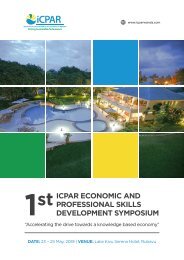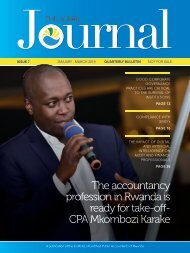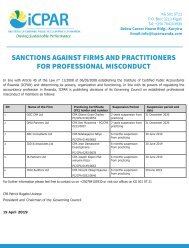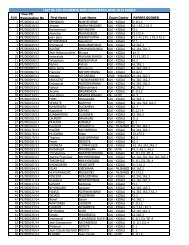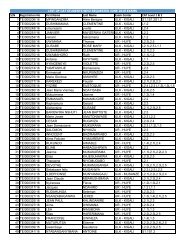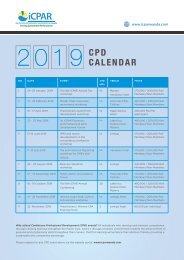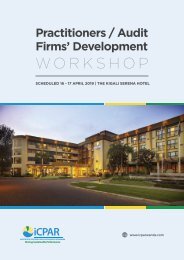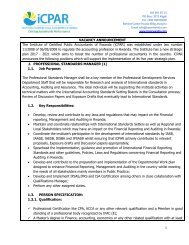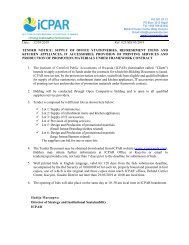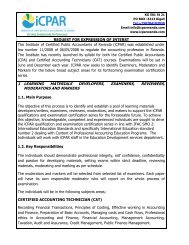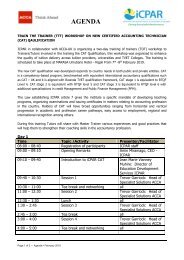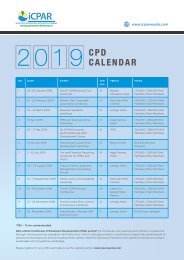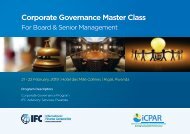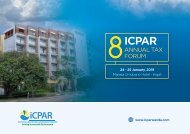ICPARStrategyinBrief(2017-2021)
Create successful ePaper yourself
Turn your PDF publications into a flip-book with our unique Google optimized e-Paper software.
icparwanda.com<br />
INSTITUTE OF CERTIFIED PUBLIC ACCOUNTANTS OF RWANDA<br />
Driving Sustainable Performance<br />
ICPAR STRATEGY<br />
IN BRIEF<br />
<strong>2017</strong>–<strong>2021</strong>
ICPAR STRATEGY IN BRIEF (<strong>2017</strong> – <strong>2021</strong>)<br />
2
ICPAR STRATEGY IN BRIEF (<strong>2017</strong> – <strong>2021</strong>)<br />
INTRODUCTORY MESSAGE FROM<br />
THE ICPAR PRESIDENT<br />
The Rwanda vision 2020 sets forth an integrated framework for Rwanda’s<br />
development. It outlines the priorities embodying a broad roadmap and<br />
development ambitions for the country. While the stakeholders that will<br />
contribute to these goals are wide ranging, the role of the accountancy<br />
profession will be central to catalyze and drive progress in areas such as<br />
good governance, accountability, transparency, promoting investment<br />
and building a solid infrastructure.<br />
iCPAR is now in the position to take the next steps in its development and<br />
to capitalize on the significant progress already made to deliver real value<br />
to the advancement of Rwanda.<br />
While delivering iCPAR’s legal mandate is central to our mission, the role<br />
and value the institute can bring to Rwanda’s economic development<br />
is significantly broader. I am proud to be the President of iCPAR at this<br />
significant and exciting time, and look forward to implementing this<br />
strategy with support from our members and key stakeholders.<br />
Bosco Mkombozi Karake<br />
President | ICPAR<br />
3
ICPAR STRATEGY IN BRIEF (<strong>2017</strong> – <strong>2021</strong>)<br />
ICPAR’S MANDATE<br />
The Institute of Certified Public Accountants of Rwanda (iCPAR) is the<br />
National Professional Accountancy Organization (PAO). iCPAR exists<br />
to strengthen and support the accountancy profession in Rwanda and<br />
thereby serve the public interest by promoting professional and ethical<br />
standards.<br />
The Institute’s broad remit, which is key to supporting Rwanda’s economic<br />
growth and ambitions, includes fulfilling its legal mandate to:<br />
• Regulate and promote the accountancy profession;<br />
• Lead the implementation of, and compliance with international<br />
standards;<br />
• Undertake investigation and discipline of accountants; and<br />
• Deliver and examine accounting qualifications.<br />
Our vision is to ensure that Rwanda has a strong, relevant and<br />
sustainable profession and our mission is to build a strong and<br />
engaged professional accountancy organization that consistently<br />
anticipates and delivers on stakeholder expectations while acting<br />
firmly in the public interest.<br />
iCPAR’s strategy to <strong>2021</strong> will enable the Institute to meet the demand for<br />
high-quality professional accountants and technicians which are essential<br />
to grow Rwanda’s economy. It will do this in a sustainable way that<br />
deepens relevance across its stakeholder groups; the private and public<br />
sectors, driven by our values of integrity, public interest,<br />
professionalism, and innovation.<br />
4
ICPAR STRATEGY IN BRIEF (<strong>2017</strong> – <strong>2021</strong>)<br />
THE NEED FOR PROFESSIONAL ACCOUNTANTS<br />
AND A STRONG PAO<br />
An aspiration of the Rwanda Vision 2020 is for Rwanda to achieve middle<br />
income status as a knowledge-based economy. A strong accountancy<br />
profession will be central to achieving good governance and improving<br />
accountability, transparency and efficiency in resource deployment.<br />
A robust accountancy education ensures competencies and expertise<br />
that contribute to economic growth and development. A well-regulated<br />
accountancy profession ensures sound ethics, good governance and the<br />
implementation of international standards and practices.<br />
Research shows a positive correlation between the number of accountants<br />
in employment and GDP per capita and United Nations Development<br />
Index. According to the Nexus 2 study conducted by IFAC, it is estimated<br />
that accountants add $½ trillion to the global economy. Rwanda needs to<br />
significantly increase the number of nationally qualified accountants if it<br />
is to fulfill its desire of being a financial and services hub and help bolster<br />
service delivery across the public sector.<br />
5
ICPAR STRATEGY IN BRIEF (<strong>2017</strong> – <strong>2021</strong>)<br />
A STRONG START<br />
iCPAR has made significant progress since its inception in 2008. iCPAR<br />
has already achieved a number of key milestones, many of which directly<br />
respond to recommendations made by international partners such as the<br />
World Bank (WB) and IFAC; it has:<br />
• Established a secretariat and governance structure – the building<br />
blocks for a strong Professional Accountancy Organisation;<br />
• Established a pipeline of locally trained, professionally qualified<br />
accountants through the national qualification;<br />
• Grown the iCPAR membership from 98 in 2009 to 407 in 2016 i.e. an<br />
annual average of 22.6%;<br />
• Elaborated the strategic plan (2012-2016); and established a<br />
continuing professional development (CPD) programme;<br />
• Become a trusted partner and service provider to key organisations<br />
in Rwanda;<br />
• Achieved IFAC Associate membership and is a founding member of<br />
the Pan African Federation of Accountants (PAFA); and<br />
• Doubled internally generated revenue from 26% in 2009 to 50%<br />
in 2016.<br />
6
ICPAR STRATEGY IN BRIEF (<strong>2017</strong> – <strong>2021</strong>)<br />
THE NEXT PHASE FOR ICPAR<br />
The WB 2015 Report on the Observance of Standards and Codes (ROSC<br />
A&A)concluded that, whilst Rwanda had made significant progress in<br />
strengthening corporate financial reporting since the first 2008 ROSC<br />
A&A, further development is needed to support a growing economy.<br />
The positive outcomes of many of iCPAR’s successes to date also reinforce<br />
the need to increase the number of accountants and help to create the<br />
necessary impact to spur economic growth and development.<br />
Challenges include:<br />
• Lack of awareness from the general public as to the importance of<br />
professional accountants and value they, and their profession<br />
can deliver;<br />
• A need to further strengthen accountancy education and tuition<br />
and enhance pass rates;<br />
• A current inability to produce the number of professional<br />
accountants required by the public sector in particular – resulting in<br />
under-qualified individuals performing accounting and finance<br />
roles – not properly regulated and without the required skills; and<br />
• The need to reach maturity across the full range of IFAC membership<br />
obligations and achieve full membership.<br />
These challenges present opportunities for iCPAR to work with its<br />
stakeholders, to increase the pipeline of professional accountants and<br />
grow capacity within the profession.<br />
Rwanda Vision 2020 seeks to achieve a skilled labour force for Rwanda.<br />
This is a key driver for economic development and iCPAR can play a<br />
central role to support its achievement. iCPAR will continue the journey of<br />
sustainable growth and aims to become a vibrant PAO and a full member<br />
of IFAC.<br />
7
ICPAR STRATEGY IN BRIEF (<strong>2017</strong> – <strong>2021</strong>)<br />
THE STRATEGY<br />
This strategy seeks to build up and advance the key enablers for iCPAR’s<br />
success while mitigating its challenges over the next five years. This<br />
approach will optimize the Institute’s contribution to Rwanda. Robust<br />
prioritisation activity has been undertaken to ensure that iCPAR focuses<br />
on those areas that will drive immediate value and short-term stability<br />
while building the foundation for long-term sustainability.<br />
The strategy map tells the story of how iCPAR will create value.<br />
The strategic pillars ensure iCPAR remains true to its vision and mission<br />
and delivers its legal mandate. The objectives support: organisational<br />
capacity, internal business processes, financial stewardship, and ultimately<br />
drive stakeholder value as can be seen in ICPAR Strategy Map.<br />
8
ICPAR STRATEGY IN BRIEF (<strong>2017</strong> – <strong>2021</strong>)<br />
ICPAR STRATEGY MAP<br />
STRATEGIC OBJECTIVES AND STRATEGY MAP<br />
STAKEHOLDERS<br />
STRENGTHEN<br />
MEMBER VALUE<br />
GROW THE<br />
PROFESSION<br />
STRENGTHEN<br />
STAKEHOLDER VALUE<br />
FINANCIAL<br />
STEWARDSHIP<br />
EXPAND REVENUE<br />
STREAMS<br />
GROW THE<br />
MEMBERSHIP BASE<br />
INTERNAL<br />
PROCESS<br />
STRENGTHEN THE<br />
QUALIFICATION<br />
FRAMEWORK<br />
BUILD CAPACITY<br />
TO COMPLY<br />
WITH SMOs<br />
INSTITUTIONAL<br />
CAPACITY<br />
ESTABLISH<br />
APPROPRIATE<br />
INFRASTRUCTURE<br />
STRENGTHEN<br />
INSTITUTION<br />
CAPACITY<br />
STRENGTHEN<br />
LEGAL<br />
FRAMEWORK<br />
9
ICPAR will need to partner with key stakeholders to energize its revenue<br />
generation initiatives over the next five years in order to deliver on its<br />
strategic objectives. The main drivers will be to have a competent<br />
workforce that can anchor sustainable performance and a qualification<br />
framework, support for quality tuition provision and exam delivery<br />
process to guarantee quality technician and professional accountancy<br />
graduates that meet industry/market needs.<br />
Sustainability is a key pillar of the strategy. The target is to build the<br />
capacity to generate enough internal revenues to be able to cover a<br />
substantial portion of the institute’s recurrent expenditure.<br />
Internally generated revenues will be driven by subscription and fees as<br />
the institute is primarily a membership organization. These noble efforts<br />
to increase the revenue base will need to be complemented by grants in<br />
the interim as the institute works to put the key enablers in place.<br />
This strategy, subject to availability of resources will enable the institute<br />
provide the country with the required number of accounting personnel<br />
both at the technical and professional level.
ICPAR STRATEGY IN BRIEF (<strong>2017</strong> – <strong>2021</strong>)<br />
KEY STRATEGIC INITIATIVES<br />
Below is a demonstration of what our key interventions mean for our stakeholders<br />
STRATEGIC<br />
OBJECTIVES<br />
STAKEHOLDERS<br />
FINANCIAL STEWARDSHIP<br />
KEY INITIATIVES<br />
WE WILL:<br />
Develop a brand strategy and a 3 year communication plan<br />
Develop and implement a public interest stakeholder<br />
collaboration strategy (Thought leadership and partnerships)<br />
Establish a member engagement strategy and a lifelong<br />
learning support framework<br />
Develop a long-term revenue enhancement strategy<br />
Establish a membership growth strategy; and collaborate to<br />
establish a sustainable “revolving education fund”<br />
WHAT THIS MEANS FOR OUR STAKEHOLDERS<br />
• Better recognition for our students and members<br />
• iCPAR members are up to date with the latest developments<br />
and are therefore better equipped to support business and<br />
enhance their own employability<br />
• Our members will have confidence that we are listening to<br />
them and addressing their concerns<br />
• iCPAR provides commentary and insight on key developments<br />
within the profession bringing benefits to business,<br />
government and members<br />
• Members on the register are bound by rules of professional<br />
conduct that provides reassurance to business.<br />
• Members benefit from being part of a professional network<br />
• Members benefit from better support tailored to their<br />
circumstances. iCPAR better meets the needs of business by<br />
ensuring members have relevant skills<br />
• Business understands the benefits of employing a<br />
professionally qualified accountant. Government benefits from<br />
more robust practices across business<br />
• iCPAR is better equipped to support its members and<br />
students.<br />
• Regulators have confidence in the long-term sustainability of<br />
ICPAR<br />
11
ICPAR STRATEGY IN BRIEF (<strong>2017</strong> – <strong>2021</strong>)<br />
STRATEGIC<br />
OBJECTIVES<br />
KEY INITIATIVES<br />
WE WILL:<br />
WHAT THIS MEANS FOR OUR STAKEHOLDERS<br />
INTERNAL PROCESSES<br />
Establish an enhanced CAT & CPA Qualification; a<br />
competence framework with new market driven pathways;<br />
and strengthen the examination delivery process<br />
Review and empower the Institute’s Commissions and<br />
Committees<br />
• iCPAR is able to meet business and government demand for a<br />
technician-level qualification increasing expertise at this level.<br />
There is a further route into the profession for students<br />
• The skills of accountants in key sectors are enhanced, better<br />
supporting business and government. Members and students<br />
are recognised for the skills they bring to further growth and<br />
add public value<br />
• Our students are better supported to successfully progress<br />
through the examinations<br />
• Our regulators are confident that our process is rigorous and<br />
employers and government have increased visibility of and<br />
confidence in the skills of iCPAR members<br />
INSTITUTIONAL CAPACITY<br />
Restructure and align internal capabilities to deliver mandate<br />
(structure, people and performance systems)<br />
Establish a more appropriate ICT infrastructure to deliver the<br />
mandate; and secure “own premises” for current needs and<br />
income generation<br />
Review and update the iCPAR Law and its Bi-Laws<br />
• Our members are clear concerning our regulations. Our<br />
regulators have confidence in the robustness of our regulations<br />
• Our members and students will benefit from improved,<br />
personalised support and access to iCPAR with the technology<br />
that works for them<br />
• Our members and students can attend events at our offices,<br />
thus feeling close to their institute<br />
• Our staff are motivated by the environment in which they work<br />
• iCPAR has a robust structure to deliver its strategic goals in a<br />
sustainable way<br />
12
ICPAR STRATEGY IN BRIEF (<strong>2017</strong> – <strong>2021</strong>)<br />
ICPAR VALUE PROPOSITION<br />
END<br />
• Economic growth and poverty reduction<br />
• Enhanced transparency and accountability; enhanced decision-making<br />
• Enhanced investor and donor confidence; increased foreign direct investment and<br />
development partner support<br />
• Enhanced regional and international competitiveness<br />
• Contribution to the achievement of the Sustainable Development Goals<br />
• Enhanced quality of governance, financial management, reporting, and auditing in<br />
the public and private sector<br />
• Trusted advisors to the public and private sector<br />
• Enhanced implementation of international standards<br />
• Robust legal and regulatory framework<br />
• Increased access to quality education; work-ready graduates<br />
• Closing the skills gap of 5,000 accounting professionals<br />
• Highly-skilled accounting professionals who behave ethically and act in the public interest;<br />
effective finance functions<br />
• A strong, relevant, sustainable accountancy profession<br />
• Supported by a strong, engaged PAO that anticipates stakeholder expectations and<br />
acts in the public interest<br />
• Based on the core values of integrity, public interest, professionalism and innovation<br />
START<br />
13
ICPAR STRATEGY IN BRIEF (<strong>2017</strong> – <strong>2021</strong>)<br />
14
ICPAR STRATEGY IN BRIEF (<strong>2017</strong> – <strong>2021</strong>)<br />
15
Published by Institute of Certified Public Accountants of Rwanda<br />
KG 541 Street, Prester House<br />
P.O.Box: 3213 Kigali Rwanda<br />
Tel: +250 784103930<br />
Fax: +250 280103930<br />
Email: info@icparwanda.com<br />
www.icparwanda.com




